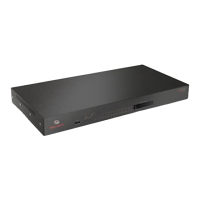1
CHAPTER
1
Introduction
Each model in the Cyclades ACS 6000 advanced console server series is a 1U appliance that serves
as a single point for access and administration of connected devices. ACS 6000 console servers
support secure remote data center management and out-of-band management of IT assets from any
location worldwide.
NOTE: References to ACS 6000 console servers in this document refer to all models in the 60XX series.
Administration can be performed with the Web Manager (with HTTP/HTTPS), the Command Line
Interface (CLI utility) or DSView
®
3 management software (version 3.5.1 and greater). Multiple
administrators can be logged into the console server at the same time.
ACS 6000 console servers provide secure local (console port) and remote (IP and dial-up) access.
The console servers run the Linux
®
operating system with a persistent file system in Flash memory,
and they can be upgraded from either an FTP or DSView software server.
Two PC card/slots support modem (V.92 and ISDN), Ethernet, fast Ethernet (fiber optic), wireless
LAN and storage PC cards (16 bit and 32 bit). Two fast Ethernet ports support connections to more
than one network or configuration of Ethernet bonding (failover) for redundancy and greater
reliability. Optional internal modems can be factory installed for dial-in and secure dial-back with
PPP. External modems can also be used. Connected power devices (optional) can be used for
remote power management.
ACS 6000 console servers support IPv4 and IPv6 addressing, DHCP, static and dynamic IP address
assignment (with AIDP).
Security Profiles determine which network services are enabled on the console server.
Access to ports can be optionally restricted, based on authorizations that an administrator can
assign to custom user groups. Groups can also be authorized to manage power while connected to
devices. The following are also configurable:
• Local and remote authentication
• Support for remote groups on Radius, TACACS+ and LDAP authentication servers
• Local and remote data buffering. Groups can also be authorized to manage buffered data
• Event notifications

